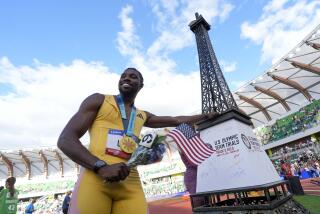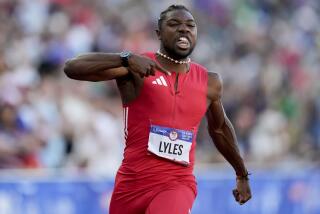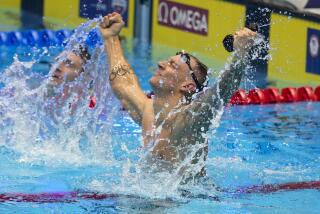Sprinter Capel gets life back on track
- Share via
EUGENE, Ore. -- Ah, the modern world, which makes it impossible for parents to keep parts of their past hidden from computer-savvy children.
Especially from an 8-year-old who, her father says, reads at a sixth-grade level.
John Capel’s older daughter, Janya, was 7 when she began Googling her father’s name. She found out he made two Olympic teams and was a world champion in track and field, but those weren’t the items in the stories that made the biggest impression on her.
It was Capel’s frequent problems with marijuana that caught her attention.
He tested positive at the 2001 NFL combine, was arrested for possession a couple of months later, then tested positive again in 2004 and 2006, leading to a two-year ban from track. Capel, 29, said it was Janya’s reaction to what she read on the Internet that led him to clean up his act and return to the sport in time to compete at the U.S. Olympic trials.
He finished third in a first-round heat of the 200 meters Friday with a time of 20.73 seconds and moved into today’s quarterfinals. Last weekend, Capel was eliminated in the 100-meter semifinals.
“Listening to my little girl just about every other day talking about me getting in trouble for smoking [turned me around],” Capel said. “She will probably get on me tonight again. She’ll say, ‘Dad, are you still getting in trouble? Are you still smoking? Are you making good decisions?’
“She is a pretty brutal little girl. She says more to me about it than my wife does.”
Janya Capel’s hectoring came on the heels of another epiphany for Capel. In 2007, his offer to help as a football coach at his old high school was declined for fear he would be a bad influence.
“I was hard-headed,” Capel said. “I never was the type of person that went by the rules too much. I always kind of went by my own. When you are in professional sports, you have to go by their rules, and it took me a little time to learn that.”
Marijuana cost Capel plenty. A talented wide receiver at Florida, he dropped to the seventh round of the NFL draft after the positive test at the combine. The Bears, who drafted him, cut Capel before the start of his first training camp, two months after the possession arrest. He soon returned to track.
In 2004, U.S. Olympic coach George Williams chose not to use Capel on the sprint relay, which won a silver medal, because he had tested positive at a meet in Germany three weeks earlier. Although that offense did not include a suspension, Williams clearly was worried Capel might test positive again during the Athens Games.
“They had to make sure they saved face for USA Track & Field,” Capel said. “It was all for the better. It makes you hungrier and stronger.”
During his two-year suspension, Capel, now a father of three, worked breaking cement and driving a forklift for $32,000 a year in his hometown of Brooksville, Fla.
“It was kind of what I grew up watching, so it was easy work to me,” Capel said.
Florida track Coach Mike Holloway convinced Capel last year to try running again, then got him in touch with venerable coach Brooks Johnson, with whom Capel has trained since last October.
Capel, 2003 world champion in the 200, had been a favorite in the event in the 2000 Olympics, but he never moved after the start of the final because he was sure a false start would be called. He began running too late and wound up last.
Capel is convinced he would have smoked the field had they called the race back.
Of course, he didn’t use that word to describe it.
------
The biggest surprise Friday night was U.S. record holder Breaux Greer’s failure to make the final in the javelin. Greer, bronze medalist at the 2007 worlds, has a shoulder injury. . . . Kara Goucher stopped Shalane Flanagan’s attempt to be the meet’s first double winner with a big kick in the final 200 meters of the 5,000. Jen Rhines also passed Flanagan, who wound up third. She and Goucher had run 1-2 in the 10,000. . . . Favorites Tyson Gay and Allyson Felix were easy first-round winners in the 200.
--
Philip Hersh covers Olympic sports for The Times and the Chicago Tribune.
More to Read
Go beyond the scoreboard
Get the latest on L.A.'s teams in the daily Sports Report newsletter.
You may occasionally receive promotional content from the Los Angeles Times.






